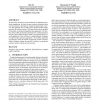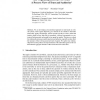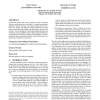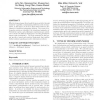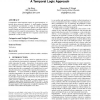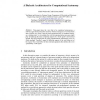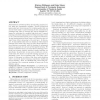ATAL
2003
Springer
13 years 8 months ago
2003
Springer
One of the factors holding back the application of multiagent, distributed approaches to large-scale sensor interpretation and diagnosis problems is the lack of good techniques fo...
ATAL
2003
Springer
13 years 8 months ago
2003
Springer
ATAL
2003
Springer
13 years 9 months ago
2003
Springer
ATAL
2003
Springer
13 years 9 months ago
2003
Springer
We previously developed a social mechanism for distributed reputation management, in which an agent combines testimonies from several witnesses to determine its ratings of another...
ATAL
2003
Springer
13 years 9 months ago
2003
Springer
Abstract. We are developing a decentralized approach to trust based on referral systems, where agents adaptively give referrals to one another to find other trustworthy agents. In...
ATAL
2003
Springer
13 years 9 months ago
2003
Springer
Agents must decide with whom to interact, which is nontrivial when no central directories are available. A classical decentralized approach is referral systems, where agents adapt...
ATAL
2003
Springer
13 years 9 months ago
2003
Springer
Effective human teams often benefit from proactivity through members’ capability of anticipating different needs of teammates. In this paper, we focus on three issues related...
ATAL
2003
Springer
13 years 9 months ago
2003
Springer
Commitments model important aspects of agent interactions, especially those arising in e-business. A small number of patterns of commitments accommodate a variety of realistic int...
ATAL
2003
Springer
13 years 9 months ago
2003
Springer
This paper takes the view that to be considered autonomous, a software agent must possess the means by which to manage its own motivations and so define new goals. Using the motiva...
ATAL
2003
Springer
13 years 9 months ago
2003
Springer
Hierarchies are powerful tools for decomposing complex control tasks into manageable subtasks. Several hierarchical approaches have been proposed for creating agents that can exec...

